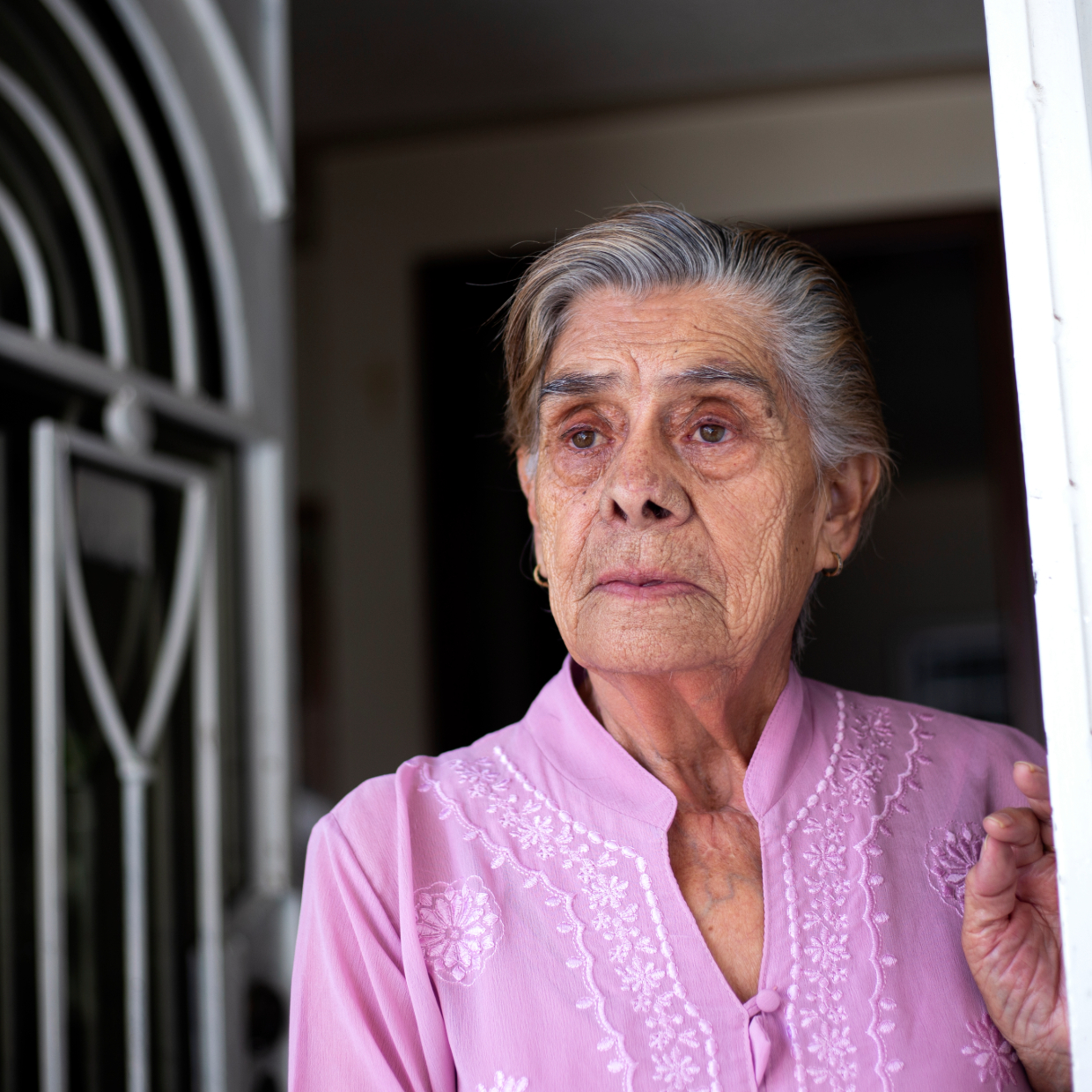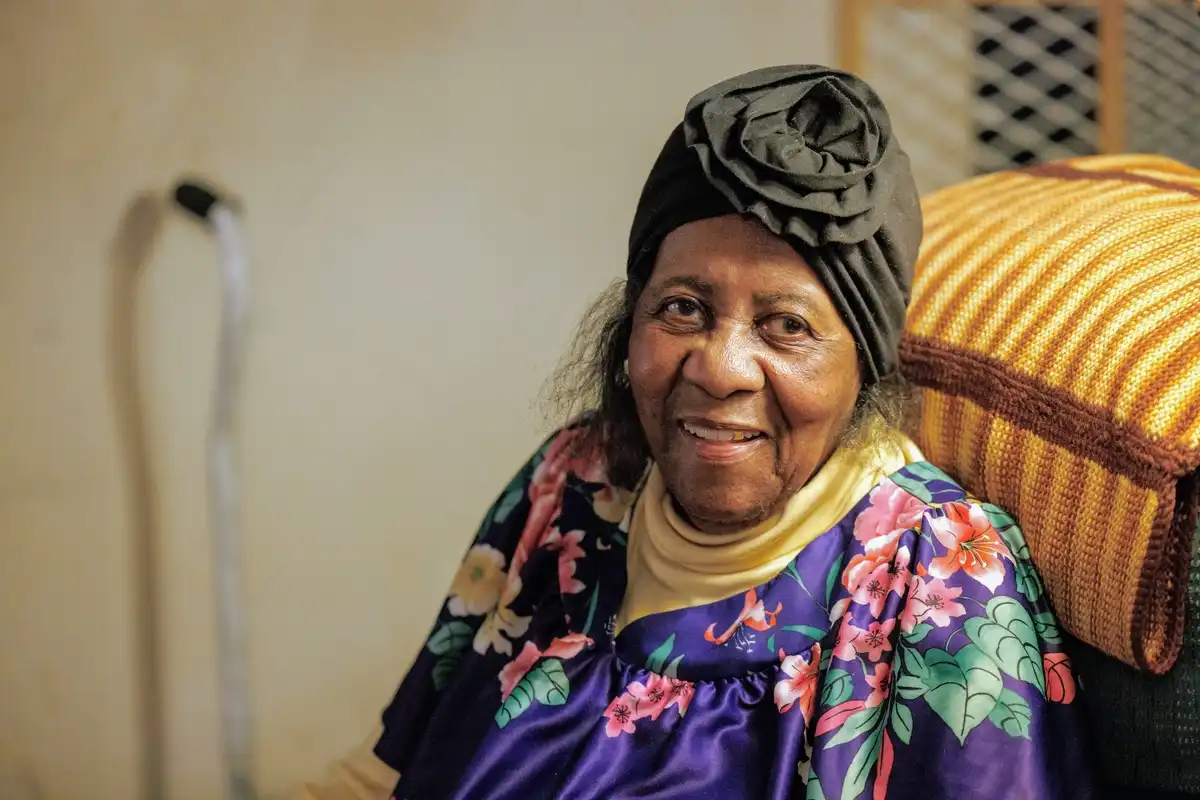A Population Facing Daily Health Challenges
The aging population is growing and changing. Older Americans are more likely to have multiple chronic conditions, like heart disease, diabetes or kidney disease, and, as families move apart, less likely to have nearby support. That’s where Meals on Wheels comes in for both seniors and their loved ones.
94% of adults age 60+ have at least one chronic condition
26% of home-delivered meal clients reported falling in the last month
66% of home-delivered meal clients take 5+ medications a day

Learn More
The Health Risks of Hunger and Isolation
Did you know that food insecure older adults are:
- 19% more likely to have high blood pressure
- 57% more likely to have congestive heart failure
- 65% more likely to be diabetic
- 66% more likely to have experienced a heart attack3
than food secure older adults, and loneliness is associated with a 32% increased risk of stroke?4 Learn more about the issues facing older adults and their health.
Providing More Than a Meal
97% of providers train drivers to keep an eye out for senior well-being
89% of providers train drivers to look for safety issues around the clients’ home
60% of providers connect seniors to services in the community when needs are identified
Citations for statistics: 5
Meals on Wheels provides a sense of security, especially for homebound older adults, for whom the person delivering their meals might be the only person they see all week. This consistent and reliable check-in puts the minds of seniors and their loved ones at ease, knowing that if a health concern arises, someone will be there to observe and help.
The power of Meals on Wheels service is more than a healthy meal and a friendly face. As trusted members of the community, Meals on Wheels providers are welcomed into the homes and lives of the seniors they serve, making them uniquely positioned to support well-being and healthy aging in place.
You get to know the people on your route … as you get to know the people, you can tell just from talking to them for a few minutes, whether they’re doing well or not doing well.Meals on Wheels Volunteer
Local providers are able to observe changes to physical and mental health conditions, identify risks before they become problems, address problems before they become health issues and avert health issues before they become catastrophic and costly—helping safeguard senior health and independence. This can mean the difference between independent living at home and a transition to a costly long-term care facility.

Senior Health and Independence
Joel’s Story of Health, Hope and Perseverance
At 65 years old, Joel is primarily homebound, has given up driving and struggles to walk around the block — one of the few physical activities that helps him maintain a healthy weight and lifestyle. His family wants him to go into assisted living, but he values his independence and the comfort of his home, where he’s settled for more than five years with his beloved cat.
“I started having medical issues beyond what I already have because my diet consisted of frozen meals you buy at the grocery store,” Joel says. “After eating them for a couple of years, [because of] the salt content, my body started blowing up.”
Joel says Meals on Wheels is one of the main reasons he can maintain his weight, keep his walking regime and stay home. “I’m only 65; I still got a lot of life to go.” It’s a perfect example of the power of Meals on Wheels, which might just prolong Joel’s life.
An Evidence-Based Solution
Research consistently reports that Meals on Wheels service:
- Reduces use of costly health care services
- Reduces nursing home use and increases ability to age in place
- Reduces health care costs
- Increases food security
- Improves diet quality
- Reduces or slows decline in nutritional risk
- Reduces social isolation and loneliness
- Reduces falls and increases home safety
Before receiving our meals, her cholesterol was through the roof, and she was diabetic. She did not feel well at all. Thanks to her diet change, she no longer has to take cholesterol medications, and her doctor now declared her pre-diabetic.Meals on Wheels provider
Of Home-Delivered Meal Clients
79% say the meals help improve their health
78% say knowing they will receive regular visits has made them feel safer at home
91% say the meals help them live independently
Citations for statistics: 6
How Meals on Wheels Improves Senior Health and Independence
These remarkable outcomes are attributed to the profound impact of Meals on Wheels on critical aspects of older adults’ well-being, including food security, diet quality, nutritional status, social isolation, loneliness and falls/home safety — factors that significantly contribute to health care use and costs.
By fostering social connections, providing safety checks and delivering nutritious meals, Meals on Wheels supports older adults to maintain their health, independence and ability to age in their own homes and communities.
See The ResearchHelp Us End the Wait™
Right now, too many seniors are waiting for the meals and care they desperately need for healthy aging. Meals on Wheels providers are ready to serve more older adults, but we need your help to make it happen. Your support can help End the Wait and provide life-changing services to seniors in your community. Together, we can ensure every senior has access to nutrition and meaningful connections.
Citations
- National Council on Aging. Chronic Inequities: Measuring Disease Cost Burden Among Older Adults in the U.S. A Health and Retirement Study Analysis. Page 5, Figure 2. April 2022. Data are for adults age 60 and older in 2018. https://ncoa.org/article/the-inequities-in-the-cost-of-chronic-disease-why-it-matters-for-older-adults
- 2023 Administration for Community Living (ACL) National Survey of Older Americans Act (OAA) Participants. Figures are from the responses of a nationally representative sample of clients receiving Home-delivered meals funded through Title III of the OAA. Data obtained through special ACL request.
- Ziliak, J., Gundersen, C. (August 2021). The Health Consequences of Senior Hunger in the United States: Evidence from the 1999-2016 NHANES. Report for Feeding America. Available from Feeding America: https://www.feedingamerica.org/research/senior-hunger-research
- Cené CW, Beckie TM, Sims M, Suglia SF, Aggarwal B, Moise N, Jiménez MC, Gaye B, McCullough LD; on behalf of the American Heart Association Social Determinants of Health Committee of the Council on Epidemiology and Prevention and Council on Quality of Care and Outcomes Research; Prevention Science Committee of the Council on Epidemiology and Prevention and Council on Cardiovascular and Stroke Nursing; Council on Arteriosclerosis, Thrombosis and Vascular Biology; and Stroke Council. Effects of objective and perceived social isolation on cardiovascular and brain health: a scientific statement from the American Heart Association. J Am Heart Assoc. 2022;11:e026493. doi: https://doi.org/10.1161/JAHA.122.026493
- Meals on Wheels America 2025 Member Benchmarking Survey, conducted by Meals on Wheels America.
- 2023 Administration for Community Living (ACL) National Survey of Older Americans Act (OAA) Participants. Figures are from the responses of a nationally representative sample of clients receiving Home-delivered meals funded through Title III of the OAA. Data obtained through special ACL request.


